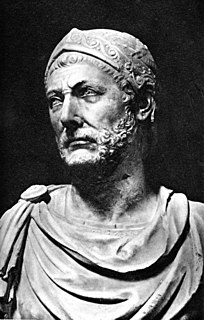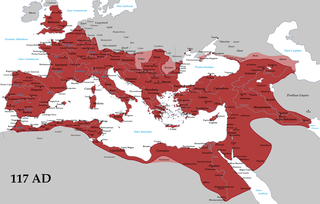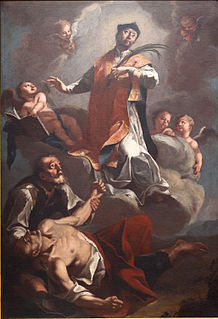Related Research Articles

Caesar Augustus was the first Roman emperor, reigning from 27 BC until his death in AD 14. His status as the founder of the Roman Principate has consolidated an enduring legacy as one of the most effective and controversial leaders in human history. The reign of Augustus initiated an era of relative peace known as the Pax Romana. The Roman world was largely free from large-scale conflict for more than two centuries, despite continuous wars of imperial expansion on the Empire's frontiers and the year-long civil war known as the "Year of the Four Emperors" over the imperial succession.

Caligula, formally known as Gaius, was the third Roman emperor, ruling from AD 37 to 41. The son of the popular Roman general Germanicus and Augustus's granddaughter Agrippina the Elder, Caligula was born into the first ruling family of the Roman Empire, conventionally known as the Julio-Claudian dynasty.

The Holy Roman Empire was a multi-ethnic complex of territories in Western and Central Europe that developed during the Early Middle Ages and continued until its dissolution in 1806 during the Napoleonic Wars. The largest territory of the empire after 962 was the Kingdom of Germany, though it also included the neighboring Kingdom of Bohemia and Kingdom of Italy, plus numerous other territories, and soon after the Kingdom of Burgundy was added. However, while by the end of the 15th century the Empire was still in theory composed of three major blocks – Italy, Germany, and Burgundy – in practice only the Kingdom of Germany remained, with the Burgundian territories lost to France and the Italian territories, ignored in the Imperial Reform, although formally part of the Empire, were splintered into numerous de facto independent territorial entities. The external borders of the Empire did not change noticeably from the Peace of Westphalia – which acknowledged the exclusion of Switzerland and the Northern Netherlands, and the French protectorate over Alsace – to the dissolution of the Empire. By then, it largely contained only German-speaking territories, plus the Kingdom of Bohemia, the southern Netherlands and lands of Carniola. At the conclusion of the Napoleonic Wars in 1815, most of the Holy Roman Empire was included in the German Confederation.

Roman Britain is the period in classical antiquity when large parts of the island of Great Britain were under occupation by the Roman Empire. The occupation lasted from AD 43 to AD 410. During that time, the territory conquered was raised to the status of a Roman province.

Hercules is the Roman equivalent of the Greek divine hero Heracles, son of Jupiter and the mortal Alcmene. In classical mythology, Hercules is famous for his strength and for his numerous far-ranging adventures.

Hannibal was a Carthaginian general and statesman who commanded Carthage's main forces against the Roman Republic during the Second Punic War. He is widely considered one of the greatest military commanders in world history. His father, Hamilcar Barca, was a leading Carthaginian commander during the First Punic War. His younger brothers were Mago and Hasdrubal, and he was brother-in-law to Hasdrubal the Fair, who also commanded Carthaginian armies.

Gaius Julius Caesar was a Roman general and statesman who played a critical role in the events that led to the demise of the Roman Republic and the rise of the Roman Empire.

Marcus Aurelius Antoninus was Roman emperor from 161 to 180 and a Stoic philosopher. He was the last of the rulers known as the Five Good Emperors, and the last emperor of the Pax Romana, an age of relative peace and stability for the Roman Empire. He served as Roman consul in 140, 145, and 161.

Nero was the fifth Roman emperor, ruling from 54 to 68. His infamous reign is usually associated with tyranny, extravagance and debauchery. Nero, originally named Lucius Domitius Ahenobarbus, belonged to the Julio-Claudian dynasty, and was adopted as heir by the emperor Claudius, his great-uncle and stepfather. Nero succeeded Claudius while not yet aged 17, and his mother, Agrippina, tried to dominate his early life and decisions, but Nero cast her off and had her killed five years into his reign.

Roman Polanski is a Polish-French film director, producer, writer, and actor. Polanski is also a fugitive from the U.S. criminal justice system; he fled the country in 1977 while awaiting sentencing for unlawful intercourse with a minor.

The Roman Empire was the post-Republican period of ancient Rome. As a polity it included large territorial holdings around the Mediterranean Sea in Europe, Northern Africa, and Western Asia ruled by emperors. From the accession of Caesar Augustus to the military anarchy of the 3rd century, it was a principate with Italy as metropole of the provinces and the city of Rome as sole capital. After the military crisis, the empire was ruled by multiple emperors who shared rule over the Western Roman Empire and over the Eastern Roman Empire. Rome remained the nominal capital of both parts until AD 476, when the imperial insignia were sent to Constantinople, following the capture of Ravenna by the barbarians of Odoacer and the subsequent deposition of Romulus Augustulus. The fall of the Western Roman Empire to Germanic kings, along with the hellenization of the Eastern Roman Empire into the Byzantine Empire, conventionally marks the end of Ancient Rome and the beginning of the Middle Ages.

The Roman Republic was the era of classical Roman civilization, led by the Roman people, beginning with the overthrow of the Roman Kingdom, traditionally dated to 509 BC, and ending in 27 BC with the establishment of the Roman Empire. During this period, Rome's control expanded from the city's immediate surroundings to hegemony over the entire Mediterranean world.

Tiberius Caesar Augustus was the second Roman emperor, reigning from AD 14 to 37. He succeeded his stepfather, Augustus.

Commodus was Roman emperor jointly with his father Marcus Aurelius from 176 until his father's death in 180, and solely until 192. His reign is commonly considered to mark the end of the golden period of peace in the history of the Roman Empire known as the Pax Romana.

Cleopatra VII Philopator was the last active ruler of the Ptolemaic Kingdom of Egypt. As a member of the Ptolemaic dynasty, she was a descendant of its founder Ptolemy I Soter, a Macedonian Greek general and companion of Alexander the Great. After the death of Cleopatra, Egypt became a province of the Roman Empire, marking the end of the second to last Hellenistic state and the age that had lasted since the reign of Alexander. Her native language was Koine Greek, and she was the only Ptolemaic ruler to learn the Egyptian language.

Saint Valentine, known as Saint Valentine of Rome, was a 3rd-century Roman saint, commemorated in Western Christianity on February 14 and in Eastern Orthodoxy on July 6. From the High Middle Ages his Saints' Day has been associated with a tradition of courtly love. He is also a patron saint of Terni, epilepsy and beekeepers.

The Roman emperor was the ruler of the Roman Empire during the imperial period. The emperors used a variety of different titles throughout history. Often when a given Roman is described as becoming "emperor" in English, it reflects his taking of the title Augustus or Caesar. Another title often used was imperator, originally a military honorific. Early emperors also used the title Princeps Civitatis. Emperors frequently amassed republican titles, notably princeps senatus, consul and pontifex maximus.

In historiography, ancient Rome is Roman civilization from the founding of the Italian city of Rome in the 8th century BC to the collapse of the Western Roman Empire in the 5th century AD, encompassing the Roman Kingdom, Roman Republic and Roman Empire until the fall of the western empire. The civilisation began as an Italic settlement in the Italian Peninsula, traditionally dated to 753 BC, that grew into the city of Rome and which subsequently gave its name to the empire over which it ruled and to the widespread civilisation the empire developed. The civilization was led and ruled by the Romans, alternately considered an ethnic group or a nationality. The Roman Empire expanded to become one of the largest empires in the ancient world, still ruled from the city, with an estimated 50 to 90 million inhabitants and covering 5 million square kilometres at its height in AD 117.

The fall of the Western Roman Empire was the process of decline in the Western Roman Empire in which the Empire failed to enforce its rule, and its vast territory was divided into several successor polities. The Roman Empire lost the strengths that had allowed it to exercise effective control over its Western provinces; modern historians posit factors including the effectiveness and numbers of the army, the health and numbers of the Roman population, the strength of the economy, the competence of the Emperors, the internal struggles for power, the religious changes of the period, and the efficiency of the civil administration. Increasing pressure from invading barbarians outside Roman culture also contributed greatly to the collapse. The reasons for the collapse are major subjects of the historiography of the ancient world and they inform much modern discourse on state failure.

Leati Joseph "Joe" Anoa'i is an American professional wrestler, actor, and former professional gridiron football player. He is currently signed to WWE, where he performs on the SmackDown brand under the ring name Roman Reigns, and is the current WWE Universal Champion in his second reign. He is part of the Anoa'i wrestling family, which also includes his father Sika Anoaʻi, brother Rosey, and cousins The Usos, Yokozuna, Rikishi, Umaga, The Tonga Kid and Dwayne 'The Rock' Johnson
References
| | This ancient Roman biographical article is a stub. You can help Wikipedia by expanding it. |